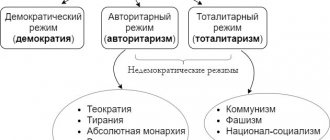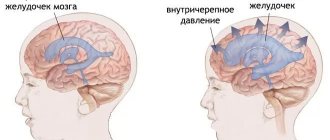Is it possible to get rid of despotism?
The tendency to tyranny will not disappear on its own. And the less the despot receives rebuff from the outside, the stronger his belief in his own superiority and infallibility will take root.
You can correct your despotic character with the help of psychotherapy and medical treatment. The correction plan depends on the severity of the pathology. During psychotherapy, it is necessary to determine the root of the problem, work through the psychological trauma, and develop the correct methods of self-affirmation.
Despots build relationships with people who have a victim mentality. Their relationship is dependent. In psychology this is called the Karpman triangle. Thus, psychotherapy sessions are indicated for all participants in the relationship. Without a change in thinking, the victim will find a new tyrant or return the relationship to its previous course.
How does a despot act?
Despots usually act very subtly. The mechanism of influence on a person is something like this: at first, the despot will be a harmless little buffoon, ready to do anything. He will give a sea of attention and compliments. Over time, a person gets used to admiration for himself, and then the despot begins to act, namely, to criticize. After the first criticism, a person does everything possible to improve. But then the criticism becomes much greater, and the victim’s desire to correct the situation increases in proportion to it. As a result, an idea is discovered that can easily control the consciousness of another person.
Also, it is important to note that a despot will appropriate all achievements for himself, and blame failures on his partner, and it is useless to appeal to an adequate perception of reality
Who is a despot?
A despot is a person who does not recognize that others are right and achieves his goals through pressure and violence. He does not need evidence or arguments; he believes that he is right in any situation. Even in relationships with the closest and dearest people, he constantly resorts to violence, humiliation, revenge, mental pressure, gaslighting (what is this?) and other aggressive methods of influence.
X The only thing about despotism is that it is almost always directed at people whom the despot considers dear and important to himself. He himself often does not notice how cruel he can be.
A despot is a tyrant who imposes his will on others through force, influence and power. A boss can be a despot, but it is much worse when one of the family members turns out to be one. Psychology considers the theory that despotism is a natural human instinct that awakens under a certain set of circumstances. According to this theory, the desire to rule is present in each of us, but it manifests itself to varying degrees in everyone.
Psychologists identify three main components of despotism:
- complete indifference to other people's feelings and opinions;
- the desire to completely control another person;
- the requirement of complete and constant self-obedience.
Despotism is capable of destroying any relationship, since a despot strives to completely deprive a partner of all rights, but allows himself almost everything. This happens in both love and friendship relationships.
Characteristics of a male despot
A fairly common situation is when the husband and father turn out to be the despot in the family. Since the man is usually much stronger, such relationships are often accompanied by physical violence. In this case, the spouse often chooses the wrong tactics. She gives in to her husband in everything and tries in every possible way to please him, hoping that this way he will become kinder. Of course, this leads to the opposite effect, and such relationships cannot be called happy.
To understand who a despot is, it is important to take into account the fact that such a person himself often does not realize the despotic nature of his behavior. Imagine a situation: a husband loves his wife, never resorts to violence, tries to provide her with such conditions that she does not work, but sits at home and raises children. But if you dig deeper, it turns out that he is simply trying to deprive his wife of freedom and independence, completely subjugating her to himself. Even if a woman initially likes such a union, over time the dependence begins to irritate her, and her feelings for the once beloved man cool down
The aggressor and his victim
In childhood, all events and human actions are perceived by a person from the point of view of polar meanings “bad” or “good”. When faced with a traumatic situation, a child always identifies his personality with one of the parties, taking on the role of “victim” or “tormentor”, and in the future already adheres to this state, recognized by the psyche as “comfortable”.
Growing up, the “victim” will strive to connect with his missing part of his personality - more confident, powerful, able to fight back. Thus, seeing before her an example of who she herself would like to be, she will experience the illusion of “processing” an unpleasant event experienced in childhood, but will not actually deviate from her role.
In turn, the “tormentor” will not be able to live without the projection of his prevailing capabilities. He needs to receive constant confirmation of his strength, impunity, ability to control and suppress. At the same time, the “victim” is not assigned a secondary role, because in her ability to suffer, show generosity, and forgive, the aggressor finds the missing elements of his own, flawed personality.
How to communicate with a despot
Despotism is dangerous. It is worth considering the situation of tyranny in the family:
- Children cannot satisfy their natural need for activity.
- The wife is afraid to stand up for them.
- The spouse and children are constantly subjected to unfounded attacks.
- Over time, all family members are destroyed as individuals.
You need to deal with such a person carefully. No matter how sad it may sound, you need to be silent and leave
If there were acts of violence or cruelty, report them to the police. The despot does not understand logic. His answer to everything will be rude and short.
However, living by the principle “it’s our fault, but dad is always right” is also wrong. It is necessary to recognize the problem, call a spade a spade, and unite with children and other family members. And then either leave, or endure, but not indulge.
In order not to aggravate the situation, if a person is despotic, it is recommended:
- avoid criticism, especially public criticism;
- restrain emotions;
- do not blame the tyrant and do not point out his shortcomings and mistakes;
- avoid generalizations like “you ruined our whole life”;
- do not make retaliatory demands, reproaches, or threats.
A golden cage for a despot
Despotism is not inviolability. The monarch lived as if in a golden cage, as he was bound by many restrictions. For example, his life was clearly regulated by palace etiquette, conventions and prejudices. Often this was all done in order to protect the sacred monarch. However, sometimes a ruler could even be killed simply because, in the opinion of the astrologer, his life on earth had expired. There is no need to explain why there was always a soothsayer at the courts. Any ruler was interested in having an astrologer prolong his life as much as possible. As a result of this, it was astrologers who played the role of “gray cardinals”, since, paradoxically, the life of the semi-divine ruler depended on them.
How does despotism manifest itself?
The most common form of despotism is family despotism. It usually manifests itself in the form of physical abuse or psychological abuse. One of the partners tries to completely subjugate the other, putting pressure on him by any means available to him. A despotic person completely ignores other people's desires, rights, freedoms and boundaries of personal space. He perceives all family members as property, but he himself believes that he loves them.
As a rule, a despot is a very touchy and vindictive person who perceives his behavior as a way of restoring justice. Through his actions, he tries to punish the offending family member, and this helps him look better in his own eyes. Also, such behavior allows him to increase his own self-esteem and restore damaged self-esteem.
A despot always strives to subjugate those around him and force them to act according to his orders. Despite this, he does not know how to be a leader at all. Due to his aggressive position, he can force others to obey him, but cannot inspire respect in them. In addition, he is not able to resolve conflict situations; instead, he himself constantly provokes conflicts. Such behavior leads to the fact that over time the despot causes only fear, hostility and complete misunderstanding in those around him.
Responsibilities of a Despot as Head of the Priestly Hierarchy
He had full authority to perform all religious ceremonies related to birth and the fertility cycle. In some cases, the ruler could even abolish the veneration of the old gods and establish a completely new cult (as happened in Egypt).
But what the reigning monarch should never have done was take part in rituals associated with death. This was partly due to the fact that divine power could only bring good, only win, but not sow death and grief. In addition, sometimes rulers introduced their own cult. This created the impression of inviolability and sacredness of the ruler’s body. Consequently, the attempt could be equated to sacrilege, an act against God (or gods) and was punished in the most severe manner. For example, an unlucky murderer could be executed, expelled, and the like. But not everything was so smooth.
Traits of despotism
In a society with a broken perception of violence and personal boundaries, despotism can be perceived as a manifestation of character, and a person will even be respected for this. The first and most characteristic sign of despotism is the use of violence as the norm of behavior and the only possible way to regulate relations. Despots do not know how to ask, negotiate or find compromises. If the partner’s behavior does not correspond to the desires of the despot, various types of violence can be used. Although at first the despot, demonstrating his dissatisfaction, may give another the opportunity to correct his mistake, but if this does not happen immediately, he will immediately face punishment. It is also worth noting that despots often put forward very strange demands, in which discontent may be caused by what others consider to be the norm.
Message from Alexis de Tocqueville
| I want to imagine in what new forms despotism will develop in our world: I see countless crowds of equal and similar people who spend their lives in a tireless search for small and vulgar joys that fill their souls. Each of them, taken individually, is indifferent to the fate of all the others; his children and closest friends constitute for him the entire human race. As for other fellow citizens, he is close to them, but does not see them; he touches them, but does not feel them; he exists only by himself and only for himself. And if he still has a family, then we can at least say that he has no fatherland. Above all these crowds rises a gigantic protective power, providing everyone with pleasures and monitoring the fate of everyone in the crowd. This power is absolute, meticulous, fair, prudent and affectionate. It could be compared to parental influence if its task, like parental influence, was to prepare a person for adult life. Meanwhile, this power, on the contrary, strives to preserve people in their infant state. She would like citizens to enjoy themselves and not think about anything else. She willingly works for the common good, but at the same time wants to be the sole authority and arbiter. She takes care of the safety of the citizens, provides for and provides for their needs, facilitates their enjoyment, takes charge of their main affairs, manages their industry, regulates the rights of inheritance and deals with the division of their inheritance. Why shouldn’t she completely deprive them of the restless need to think and live in this world? It is in this way that this power makes recourse to freedom of choice less and less useful and rarer; it constantly narrows the sphere of action of the human will, gradually depriving each individual citizen of the opportunity to use all his abilities. Equality has fully prepared people for this state of affairs: it has taught them to put up with it, and sometimes even perceive it as some kind of good. After all the citizens have passed through the strong embrace of the ruler in turn and he has molded them into what he needs, he extends his mighty hands to society as a whole. He covers it with a network of small, florid, uniform laws that prevent the most original minds and strong souls from rising above the crowd. He does not crush the will of people, but softens it, bends and directs it; he rarely encourages action, but constantly resists anyone acting on his own initiative. It does not destroy anything, but prevents the birth of something new. He does not tyrannize, but interferes, suppresses, irritates, extinguishes, stupefies and ultimately turns the entire people into a herd of timid and hardworking animals, whose shepherd is the government. I have always been confident that this form of slavery, quiet, measured and peaceful, the picture of which I have just depicted, could be combined, although it is difficult to imagine, with some external attributes of freedom and that it could well be established even in the shadow of popular power . Our contemporaries are constantly haunted by two conflicting feelings. They feel the need to be led, and at the same time the desire to remain free. Unable to overcome either of these conflicting instincts, citizens try to satisfy both of them at once. They would like to have a single, protective and omnipotent power, but chosen by themselves. They would like to combine centralization with the power of the people, this would somehow pacify them. Being under guardianship, they reassure themselves that they chose their guardians themselves. Democracy in America |
The main signs of classical despotism
At its core, despotism represents the absolute power of one person - the despot. In managing the population of the country, the ruler relied on the apparatus of state coercion and management - the army, police guards, and officials of various ranks.
Often, the unlimited power of a despot was explained by his divine origin, which resulted in his lifetime deification. Examples include the ancient Egyptian pharaohs, Japanese emperors, Aztec and Incas rulers. European monarchs, including Russian emperors, although they were not directly deified, were still considered “God’s anointed,” that is, people who had an exclusive, divine right to rule.
Modern historians identify several main features of despotism in the classical sense of the word:
- The unlimited power of a despot. The state does not have any sets of laws, constitution, or representative bodies that limit the power of the ruler.
- Lack of private property rights in the state. All material wealth, instruments of production, land and the people themselves inhabiting the country are considered the property of the despot.
- Transfer of power by inheritance. The hereditary ruler is appointed at the personal discretion of the despot, without taking into account the opinions of the people and immediate circle.
- Justification of a despot's right to power by his divine origin, or by the divine origin of his right to rule the country.
- The country is governed through a bureaucratic or aristocratic hierarchical system.
In his work “Politics,” the great ancient Greek philosopher Aristotle defines the power of a despot over his subjects as the power of a slave owner over his slaves. Meanwhile, in reality there were many exceptions to the above classical rules
So, in a number of cases, the despot could take into account the opinion of the people or his associates
True, such democratic deviations were temporary and caused by extreme necessity - a difficult foreign policy or economic situation, the threat of a revolutionary explosion, etc.
There were also reverse exceptions: in Rome, the emperor was legally considered a “principle” - “first among equals”, and all his important decisions for the state had to receive the approval of the Senate. In fact, the rule of emperors in most cases bore the character of despotism.
All despotisms had private property, but the rights to it were not secured by any laws. Thus, a craftsman or peasant in ancient Egypt or Persia could sell his goods, buy various utensils for his house, and raise livestock. But, since he himself was de facto the personal slave of the ruler. It was the will of the despot not only to take from his subject not only his property, wife or children, but also life itself.
Inheritance of power took place under despotism in the form of appointing a successor at one's own discretion. True, there were often exceptions to this rule. In a number of monarchies, there were unwritten rules of inheritance - from the eldest man in the family to the next in seniority, or from father to son. Violations of such traditions by the ruler often led to rebellion, palace conspiracies and civil wars. And in a number of early feudal despotates in Eastern Europe, the successor to the despot was appointed by their overlord - the Byzantine basileus.
I am a demigod
Despotism is believed to consist in the manifestation of unfavorable characteristics of the ego. As a result, this can lead to a loss of rational control over one’s behavior, and all actions will become subordinated exclusively to the affective sphere.
Autocratic behavior cannot stop on its own. The less resistance is offered to the despot, the more he will consider himself a demigod and will begin to demand the impossible as a matter of course.
There are no people who have not at least once turned into despots in order to achieve what they want from those around them, but if this becomes a stable line of behavior, then the person definitely needs specialist advice. After all, the main signs of mental disorders are considered to be uncontrolled violence, inadequate demands and assessment of reality.
Let's consider the concept of “ancient eastern despotism”
The concept of eastern despotism comes from Herodotus, the father of history. He described a situation where rulers not only closed temples, large and small, but also forced the people to build huge, majestic tombs and tombs for themselves.
The concept of ancient Eastern despotism had certain features. Thus, the head of state, the arbiter of justice and the personification of universal law was the despot ruler. He was worshiped, he was deified, he was hated and feared. The form of government was, naturally, monarchical, and power was inherited. But the despot could not rule without relying on a powerful, ramified administrative apparatus. It was necessary in order to effectively manage a diverse society in which various strata had already formed, not to mention the emerging property inequality. In addition, already in ancient times, the society of the East took shape and acquired those features that can be traced even today. For example, it was differentiated, and each social layer not only had its place in the hierarchy, but also differed in its organization, rights and responsibilities. It was on such a foundation that the beginnings of despotism in the Ancient East could take shape and bloom wildly.
Hierarchy of ancient Eastern society
Speaking about the society of the Ancient East, we cannot ignore such a social phenomenon as slaves. Most often this was the so-called domestic slavery, when the slave was the property of a huge family. In addition, slaves worked in temple complexes, in construction, and in the fields. Who became a slave?
In principle, anyone could become a slave. Most often, this social stratum was replenished by prisoners of war. But it also happened that a free person could become a slave. This is debt slavery. The larger and stronger the community became, the greater the scale of debt slavery. If we talk about slavery in general, then in Egypt and China at the turn of the 2nd-3rd centuries, markets were even created where only slaves were sold for every taste. Even a shepherd, gardener or average craftsman could afford to buy a slave. This is also part of the characteristics of despotism. All this indicates the enormous scale of the slave trade.
Signs of despotism
A despot is distinguished by his inability to defend his point of view with arguments. He tries to impose his will by force. How does this manifest itself:
- revenge;
- aggression;
- humiliation;
- physical, sexual and psychological violence;
- threats;
- blackmail;
- reproaches;
- criticism;
- inadequate demands on others;
- anger in response to disagreement or alternative opinion.
He shifts responsibility for his mistakes and failures onto other people. And he attributes the merits, including those of others, to himself.
In family relationships, he cuts off the victim’s contacts with other people, does not let her out of the house, deprives her of finances, and controls all aspects of life. A tyrant tries to suppress a person’s personality, lower his self-esteem, and deprive him of his self-esteem.
Such a person does not know how to cooperate or respect other people. The features of despotism appear already by the age of three years of a child’s life. But such inclinations can form later. This does not depend on gender and age. It’s all due to heredity and the individual’s personal experience.
Causes of despotism
Despotic tendencies arise against the background of selfishness and egocentrism. These features are similar to each other, but have one difference. An egocentric person does not see the feelings and needs of other people, does not notice their suffering. The egoist sees the needs of other people, but he is ready to neglect them for the sake of his own goals. Many egoists are ready to go over people's heads for the sake of their own well-being.
However, despotism has even deeper roots:
- childhood psychotrauma;
- complexes;
- education in conditions of authoritarianism or permissiveness;
- inferiority complex;
- low self-esteem;
- fears;
- diffidence;
- grievances;
- megalomania;
- unmet needs;
- lack of self-esteem;
- unsatisfied need for self-realization.
Some psychologists cite psychological trauma associated with women as the cause. Relationships with your mother, your girlfriend, or any other woman can be traumatic.
What is despotism, who is a despot
Despotism (from the Greek despotes - lord, lord) is a form of government. The term “despotism” was first used by Aristotle in his work “Politics”. The thinker compared this form with slavery. The ruler indulges only his own whims and violates any laws. A despot in power is capable of destroying a state and creating genocide. The history of the world knows firsthand what the legendary despotism of rulers is:
- Genghis Khan. He created a bloodthirsty army, with which he destroyed hundreds of cities, millions of people. At the age of 13, Genghis Khan killed his brother. The reason for revenge is the stolen fish.
- Caligula. With particular cruelty he killed animals and people for fun. He made no exceptions even for his family members.
- Hitler. He wanted to use the method of genocide to leave the only, highest, according to him, race - the Aryans.
In the Ancient East, any supreme ruler in slave-holding monarchies was called a despot. This is the original meaning of the term. Later, a despot began to be called any autocratic person who thirsts for recognition and submission from other people.
Despotism is a character trait, an accentuation. Manifested by a pronounced need for power. Such a person does not take into account the opinions and desires of other people, wants to gain complete control over other people's lives, and does not accept objections and disobedience.
Psychologists note that all despots have similar positive and negative qualities. Positive characteristics include:
- the ability to get out of any situation;
- developed oratory skills;
- ability to adapt, play to the public.
Tyrants can play any emotion, make other people believe them, win them over. They are able to express any information in simple and accessible language.
What shortcomings, besides despoticism itself, do tyrants have:
- narcissism;
- cruelty;
- tendency to manipulate;
- hysteria;
- suspiciousness;
- envy;
- jealousy;
- infantilism;
- inconsistency;
- mood swings.
What it is?
Stanislaw Jerzy Lec correctly noted that from the wound inflicted on the despot, a sea of someone else’s blood flows. Despotism is an activity when a person who believes in his unlimited power cannot even believe that someone is capable of acting contrary to his wishes. From this he begins to show aggression, which is expressed in physical or psychological violence. This is exactly what is said about despotism in psychology. This is an acquired personality quality, which manifests itself in the desire to gain unlimited power.
On the other hand, the term “despotism” is used in political science. From the point of view of political science, despotism is a form of government when the state apparatus is in the hands of one person or group of people, and they have full right to control the destinies of their subjects. Simply put, despotism is unlimited power.
Despotism - what is it?
Let's start with the most general definition of this word. So, despotism is a specific form of state when all power belongs exclusively to the monarch. Such power is not regulated by law, the monarchy is usually hereditary, and the ruler rules based on the military-administrative apparatus.
Most often, despotism was found as a form of government in the ancient Eastern empires. For example, in Egypt, Assyria, Persia, Babylonia, China, India. Naturally, in this case, the word of the despot was law and was not discussed. It was during the times of despotism that the most stupid and bloody laws were adopted. And this is not surprising, since the personality of the ruler was deified. A striking example of this is the Egyptians. Even after death, the pharaoh was equated with a god and was given appropriate honors. Despite the fact that the power of the despot was de jure unlimited, de facto this was not the case. The activities of the despot were limited and often even subordinated to the interests of a narrow circle of the nobility. Thus, despotism is a convenient form of government for elites and often coexists with oligarchy.
How to help a despot and is it necessary to do so?
A despotic person does not disdain the desires of other people because they seem insignificant to him, but because he is afraid of losing his own importance in the eyes of other people. At a consultation with a psychologist, where the issue of despotism of one of the spouses is raised in the name of saving the marriage, the specialist always first finds out the areas of non-realization of the aggressor’s own capabilities and then works in these directions.
What does psychological therapy consist of with a person whose tyrannical tendencies have put family life in jeopardy:
eliminating the inferiority complex; concentration on the development of true virtues with gradual disposal of false ones; finding reference points for self-affirmation using existing abilities and talents; developing a respectful attitude towards others.
The key point in therapy is the moment when the oppressive person gains the ability to admit that he is wrong. In fact, this fact is considered one of the most important, since the tyrant always considers himself to be right, and his opinion to be unquestioningly true. When a person recognizes that in some situations the opinions of others may seem more valuable than his own, he can engage in dialogue and find compromises.
Unfortunately, not in all cases of turning to a specialist is it possible to transform a domestic despot into a person with a healthy attitude towards interpersonal communications. If a miracle does not happen, the only way out for the suppressed spouse from a traumatic relationship will be separation from the aggressor.
Differences between tyranny and despotism
Political thinkers and writers have noted tyranny as the worst form of government corruption. Tyrants and despots rarely praised and always looked with hatred and fear. A ruler with unlimited despotic power can become a tyrant. But it is not necessary that tyrant and despot mean the same thing. A despotic ruler can be benevolent if he rules with fiat, but for the benefit of the subjects. But a tyrant can never be benevolent, because a tyrant always wants to fulfill his own interests. A despot's ruler views adult humans as his children, as if they were to be ruled by the ruler. Now, if the despot ruled for the welfare of the subjects, then he
A "benevolent" despot, where as if he treated them as his slaves and used them to his advantage, he moves on to the shooting range. Despot in Greek means the head of a family who rules over the children of a family or a group of slaves. But tyrant, also originally a Greek word, means head of state or government. If the condition of the objects of the tyrant and the despot are the same, then the line of difference between them is confused.
According to Plato and Aristotle, a monarchy can be considered as royal when the ruler or king ruled over the welfare of the subjects and it will be considered as tyranny when the king uses objects for his personal well-being. Aristotle in his discussion on the tyranny of the few and the many argued that in a monarchy the king can become a tyrant, like an oligarchy, the rich and in a lawless democracy the poor can become despotic.
History has shown that a ruler with absolute power at his disposal can be a benevolent despot and a tyrant at the same time, as some of his actions are oppressive to the subjects, where as some actions may be seen by the subjects as promoting their well-being, but in both cases the ruler must apply its own rule without any legislative support.
Thus, it can be seen that the term "tyranny" is difficult to define precisely. Some authors used it as a synonym for despotism, some of them made a distinction between the two, and some of them used the term only in relation to monarchy, while some of them associated it with other forms of governments.
Characteristic features of eastern despotism
Firstly, this is the religious content of the power of the despot ruler. The monarch under despotism is considered a living god, his incarnation. Accordingly, his power was given by none other than the Almighty himself, and was absolute.
The monarch was considered the only judge, the measure of the legality of any act. Everything spoke about this: from the attitude towards the monarch to his title. Such a formulation of the problem of power was supposed to unite society. And she united. After all, if power is given to the monarch from above, if it is given to him from God, then it is simply useless to contradict the ruler. This is stupid, since divine power is by definition wise and aimed at the good of the people. That’s why the despot’s power held on; the people were simply afraid to go against their ruler. Moreover, he was considered none other than the high priest or head of the entire priestly hierarchy. Let us consider other characteristic features of despotism.
What is despoticism?
Despotism is a personality trait characterized by cruel subordination of others, suppression of their will and rights.
The behavior of a despot is characterized by:
- aggression,
- revenge,
- imposing one's will
- humiliation,
- physical violence.
The aggression of a despot is associated with phobias and fears, constant self-doubt. Feeling dissatisfaction, a feeling of being deprived of something on a subconscious level, the tyrant takes revenge on others and believes that in this way he restores his confidence and self-esteem. By imposing his will on others, humiliating a person, a despot asserts himself.
Reasons for despoticism:
- Despotism in childhood.
- Own importance.
Despots often become children who were influenced by domineering parents, which in adulthood contributed to copying their behavior. Having harbored a childhood resentment, children who were unable to cope with their fears in the future transferred it to members of their family and those around them. According to psychotherapists, this is the main reason for the manifestation of despotism in a person’s character.
Constantly instilling in a child such feelings as originality and uniqueness, inclines him to prove his importance both to himself and to others, which later becomes the foundation of despotism and self-confidence.
Male despotism
Male despotism has more frightening prognoses than female despotism. A despot man is an uncontrollable projectile, dangerous to his family and others. While a woman thinks and tries to control the situation, a man does not; it is structured completely differently: men’s feelings and reason work alternately, and if emotions appear (in this case, aggression), then the mind turns off. In this case, the consequences can be the worst, as evidenced by the statistics of domestic crimes.
In a family, it is considered normal for a despot to use mental, physical and sexual violence against a woman. The man imposes his own opinion on the correctness of the relationship to the whole family, sets rules and demands their strict observance, and in case of disobedience or violation of his rules, he applies punishment.
Having freedom of thought or speech, according to the despot, is not a woman’s rights. If a rude attitude towards his wife is shown in front of strangers, those around him often do not understand the reason for his behavior.
Pleading for mercy has no effect on him. He does not hear her, he behaves arrogantly and impudently. He likes to humiliate his woman in front of friends and acquaintances; he can threaten her, insult her, assault her (without serious injury), throw objects at her, etc.
Female despotism
Women, using strong statements, because they have both feelings and reason at work at the same time, can crush any man. Armed with reproaches and insults, attacking a man’s sexual abilities, touching his weaknesses, they are able to suppress a person; often this happens due to jealousy.
In case of resistance, representatives of the fair sex turn to blackmail and threats (file for divorce, take away children, commit suicide, etc.). Such behavior is also called emotional vampirism or emotional drug addiction.
Sometimes female despotism is expressed in vile and base actions. This could be an unfounded accusation of a husband of pedophilia, beating a child and blaming the husband for this beating, etc.
How to get rid of despotism?
To get rid of it, you must have the desire to do it and understand your problem. Realizing the meaninglessness of tyranny and the fact that an oppressive attitude has no effect on self-affirmation, importance and self-confidence will help change the attitude towards yourself and others.
The most correct way would be to contact a psychotherapist.
How to recognize a despot?
The main behavioral signs of a despotic person are:
The target's desire to take control of everyone who shows interest in him (anyone), and then the desire to maintain this control at any cost. Vengefulness, always developing in two directions - in relation to controlled objects to intimidate them and in relation to those who managed to leave the tyrant’s sphere of influence. The need to morally and physically humiliate people, which always happens openly, demonstratively. An unmistakable “feeling” that determines when surrounded by weak individuals who are not prone to moral resistance.
All despotic people are excellent manipulators, so at the very beginning of communication they can only be recognized by indirect signs. The final “revelation” of character occurs when the tyrant encounters resistance against himself or feels the complete subordination of those around him and no longer considers it necessary to hide his true “I”.
Signs of despotism
In a society where the perception of violence and personal boundaries is violated, despotism can be perceived as a manifestation of character or even respected. People who were traumatized by the dependent type in childhood fall in love with despots and tyrants as adults, again without noticing the gross violation of their freedom.
One of the characteristic signs of despotism is the perception of physical and psychological violence as a norm of behavior and a way of regulating relationships. Such mechanisms are the main ones in interaction with a despot; he practically does not know how to ask, negotiate, or seek compromises.
Any type of violence is used when the partner’s behavior does not correspond to the desires of the despot, and at first he can demonstrate his dissatisfaction and give the other the opportunity to correct himself; if this does not happen as soon as possible, then the other will be punished (a blow to the face or a week of silence - it doesn’t matter). It is worth noting that the requirements for a partner’s behavior are often quite strange, and dissatisfaction will be caused by what others perceive as the norm
The thing is that anger is caused by any behavior or opinion that contains the individuality of another, and not his personal one.
Behaviors such as gaslighting often occur when a despot convinces another that everything bad is a figment of his imagination. They can talk for a long time about how cruel treatment was invented. And rudeness is perceived this way because of the unstable mental state of the despot’s victim herself. One’s influence and guilt are never acknowledged; on the contrary, another may be accused of manipulative hysterics, when in fact these are tears of pain. Humiliation and insults in front of others become the norm, and when trying to clarify relationships, a person may be accused of lacking a sense of humor, explaining such statements as a joke. So that a person does not have doubts about the inadequacy of his partner, his circle of friends is limited, and relatives and friends who could share their opinions gradually disappear.
Typically, despots try to completely destroy another person's self-esteem in order to have even more leverage to control. Although in the first stages of a relationship, on the contrary, they will sing your praises. The mechanism is something like this: a person gets used to receiving huge doses of compliments, so at the first criticism he will do everything to improve, then the criticism becomes more frequent, and the desire to correct the situation becomes stronger. As a result, you can discover an idea from which it is very easy to manipulate the consciousness of another: “in fact, I am terrible, it’s just that others don’t notice it, but this great person knows everything about me and continues to stay close.”
It is important that the despot will appropriate all victories to himself, and blame all defeats on his partner, while the other may even be blamed for his own troubles at work, a spoiled mood, and being stuck in a traffic jam. Attempts to appeal to an adequate perception of reality are useless
We are on Telegram! Subscribe and be the first to know about new publications!
Causes of despotism
Despotism is not an innate trait and does not depend in any way on the characteristics of the nervous system and other physiological factors, but the prerequisites for its formation are laid quite early. The opinion that despotism is inherited is due to the fact that being raised by domineering parents who did not listen to the needs of the child, but only demanded unquestioning obedience, a person learns this model of behavior as the norm. In childhood, this quality has no particular place to manifest itself, since children are weak, but as they grow up, gain physical strength and master the moral methods of violence, manipulation and coercion, a person begins to implement a despotic form of interaction at all levels.
Despotism is subconsciously formed by the desire to take revenge on others for insults caused. For this, one case is not enough, usually it is being in a toxic relationship or being raised by similar methods. Insults, humiliations, and cruel punishments of a child can lead to the desire to punish not only the parents, but the whole world for remaining deaf and blind to his grief. But not only poor treatment can serve as a prerequisite for the development of despotism, but also excessive suggestion about the uniqueness, uniqueness of the child’s personality, his superiority over others. The opinion of parents is very important and shapes self-attitude; when entering the real world, such a person experiences stress from the fact that not everyone worships him, and someone openly ridicules his shortcomings. In such situations, the path chosen is to force the surrounding society to think and perceive one’s own personality within the usual framework.
For a despot, confirmation of his power becomes an obsessive neurotic idea, not saturated with need, since the methods of satisfying it are chosen inadequate. Psychological traumas must be carefully discovered in a safe environment, learned to look at them without horror and pain, and developed new ways of responding, recognizing such a history of one’s life. The despot's attempts to gain love and recognition are reminiscent of driving in lost hair with a hammer - it is painful, useless and requires enormous effort.
Tyrant husband
A despotic person, which means domineering, narcissistic, is a great grief for the family, especially if the spouse chooses the tactic “a bad peace is better than a good quarrel.” Of course, counter-aggression is also not a solution - then family life turns into an open struggle for the title of “who is stronger,” but agreeing with a dependent position will not be a relief for a woman.
Male tyranny in the family first manifests itself in small things against the backdrop of a benevolent and generally prosperous environment. The husband relieves his wife of most of the responsibility, shows himself as a friend and adviser, and only then it is discovered that this was done for the sole purpose of depriving the woman of her independence and freedom of expression.
But even having achieved his goal, a despotic person, by definition, cannot stop. He will find more and more reasons to be dissatisfied, and the woman will have to either come to terms with the eternal fate of the “guilty head”, or completely eliminate the tyrant from her life. Unfortunately, it is not possible to correct a despot husband or somehow shake him into confidence in his own rightness.
Let us touch upon the peculiarities of the power of a despot monarch
His position had nothing to do with the identification of the ruler and the state itself. It simply took its place among other mandatory institutions of power. Still, his power was not so unlimited. For example, the ruler was subject to many laws and rules established earlier. Yes, the ruler could establish new rules of life by issuing laws and decrees, but at the same time, these laws had some restrictions.
In particular, they should not contradict the fundamental principles of social life. India is a great example of this. Although the ruler could issue any decrees, they should in no case concern the violation of the caste system and the way of life of people, or issues related to faith. A very interesting question is who decided whether this or that law corresponds to the will of the gods or violates it. Even in Babylon, the laws adopted should not have conflicted with the traditional principles of law and order. Even the first set of laws was created as an attempt to protect traditional orders from new destructive phenomena in society.











